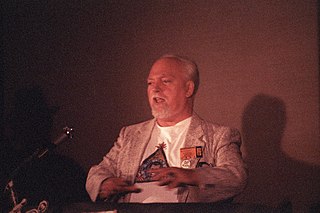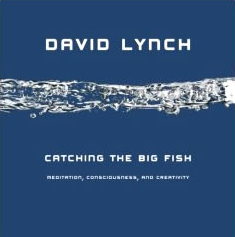
Consciousness, at its simplest, is awareness of internal and external existence. However, its nature has led to millennia of analyses, explanations and debate by philosophers, theologians, and all of science. Opinions differ about what exactly needs to be studied or even considered consciousness. In some explanations, it is synonymous with the mind, and at other times, an aspect of mind. In the past, it was one's "inner life", the world of introspection, of private thought, imagination and volition. Today, it often includes any kind of cognition, experience, feeling or perception. It may be awareness, awareness of awareness, or self-awareness either continuously changing or not. The disparate range of research, notions and speculations raises a curiosity about whether the right questions are being asked.

Robert Anton Wilson was an American author, futurist, psychologist, and self-described agnostic mystic. Recognized within Discordianism as an Episkopos, pope and saint, Wilson helped publicize Discordianism through his writings and interviews. In 1999 he described his work as an "attempt to break down conditioned associations, to look at the world in a new way, with many models recognized as models or maps, and no one model elevated to the truth". Wilson's goal was "to try to get people into a state of generalized agnosticism, not agnosticism about God alone but agnosticism about everything."

Phenomenology is the philosophical study of objectivity and reality as subjectively lived and experienced.
Experience refers to conscious events in general, more specifically to perceptions, or to the practical knowledge and familiarity that is produced by these processes. Understood as a conscious event in the widest sense, experience involves a subject to which various items are presented. In this sense, seeing a yellow bird on a branch presents the subject with the objects "bird" and "branch", the relation between them and the property "yellow". Unreal items may be included as well, which happens when experiencing hallucinations or dreams. When understood in a more restricted sense, only sensory consciousness counts as experience. In this sense, experience is usually identified with perception and contrasted with other types of conscious events, like thinking or imagining. In a slightly different sense, experience refers not to the conscious events themselves but to the practical knowledge and familiarity they produce. In this sense, it is important that direct perceptual contact with the external world is the source of knowledge. So an experienced hiker is someone who actually lived through many hikes, not someone who merely read many books about hiking. This is associated both with recurrent past acquaintance and the abilities learned through them.

In some schools of Buddhism, bardo or antarābhava is an intermediate, transitional, or liminal state between death and rebirth. The concept arose soon after Gautama Buddha's death, with a number of earlier Buddhist schools accepting the existence of such an intermediate state, while other schools rejected it. The concept of antarābhava, an intervening state between death and rebirth, was brought into Buddhism from the Vedic-Upanishadic philosophical tradition. Later Buddhism expanded the bardo concept to six or more states of consciousness covering every stage of life and death. In Tibetan Buddhism, bardo is the central theme of the Bardo Thodol, the Tibetan Book of the Dead, a text intended to both guide the recently deceased person through the death bardo to gain a better rebirth and also to help their loved ones with the grieving process.

Stanislav "Stan" Grof is a Czech-born psychiatrist who has been living in the United States since the 1960s. Grof is one of the principal developers of transpersonal psychology and research into the use of non-ordinary states of consciousness for purposes of psychological healing, deep self-exploration, and obtaining growth and insights into the human psyche. In 1993, Grof received an Honorary Award from the Association for Transpersonal Psychology (ATP) for major contributions to and development of the field of transpersonal psychology, given at the occasion of the 25th Anniversary Convocation held in Asilomar, California. He also received the VISION 97 award granted by the Foundation of Dagmar and Václav Havel in Prague on October 5, 2007. In 2010, he received the Thomas R. Verny Award from the Association for Pre- and Perinatal Psychology and Health (APPPAH). On the other hand, Grof has been criticized by the skeptic group Český klub skeptiků Sisyfos in the Czech Republic for furthering what they view as nonscientific psychology too far outside the bounds of the materialistic philosophical underpinnings of modern science. He is the only person to have been awarded the anti-prize Erratic Boulder Award twice in that country. Grof was married to psychologist Brigitte Grof in 2016.
Reality tunnel is a theory that, with a subconscious set of mental filters formed from beliefs and experiences, every individual interprets the same world differently, hence "Truth is in the eye of the beholder". It is similar to the idea of representative realism, and was coined by Timothy Leary (1920–1996). It was further expanded on by Robert Anton Wilson (1932-2007), who wrote about the idea extensively in his 1983 book Prometheus Rising.
Daniel Dennett's multiple drafts model of consciousness is a physicalist theory of consciousness based upon cognitivism, which views the mind in terms of information processing. The theory is described in depth in his book, Consciousness Explained, published in 1991. As the title states, the book proposes a high-level explanation of consciousness which is consistent with support for the possibility of strong AI.
Feminist history refers to the re-reading of history from a woman's perspective. It is not the same as the history of feminism, which outlines the origins and evolution of the feminist movement. It also differs from women's history, which focuses on the role of women in historical events. The goal of feminist history is to explore and illuminate the female viewpoint of history through rediscovery of female writers, artists, philosophers, etc., in order to recover and demonstrate the significance of women's voices and choices in the past. Feminist History seeks to change the nature of history to include gender into all aspects of historical analysis, while also looking through a critical feminist lens. Jill Matthews states "the purpose of that change is political: to challenge the practices of the historical discipline that have belittled and oppressed women, and to create practices that allow women an autonomy and space for self-definition"
Neurophenomenology refers to a scientific research program aimed to address the hard problem of consciousness in a pragmatic way. It combines neuroscience with phenomenology in order to study experience, mind, and consciousness with an emphasis on the embodied condition of the human mind. The field is very much linked to fields such as neuropsychology, neuroanthropology and behavioral neuroscience and the study of phenomenology in psychology.

Cosmic Trigger I: The Final Secret of The Illuminati is the first book in the Cosmic Trigger series, first published in 1977 and the first of a three-volume autobiographical and philosophical work by Robert Anton Wilson. It has a foreword by Timothy Leary, which he wrote in the summer of 1977.
Jo Eisinger was a film and television writer whose career spanned more than 40 years from the early 1940s well into the 1980s. He is widely recognized as the writer of two of the most psychologically complex film noirs, Gilda (1946) and Night and the City (1950).
Double consciousness is the dual self-perception experienced by subordinated or colonized groups in an oppressive society. The term and the idea were first published in W. E. B. Du Bois's autoethnographic work, The Souls of Black Folk in 1903, in which he described the African American experience of double consciousness, including his own.

Michael Tye is a British philosopher who is currently the Dallas TACA Centennial Professor in Liberal Arts at the University of Texas at Austin. He has made significant contributions to the philosophy of mind.

Catching the Big Fish: Meditation, Consciousness, and Creativity is an autobiography and self-help guide written by American filmmaker David Lynch. It comprises 84 vignette-like chapters in which Lynch comments on a wide range of topics "from metaphysics to the importance of screening your movie before a test audience." Catching the Big Fish was inspired by Lynch's experiences with Transcendental Meditation (TM), which he began practicing in 1973. In the book, Lynch writes about his approach to filmmaking and other creative arts. Catching the Big Fish was published by Tarcher on December 28, 2006.

In philosophy of mind, qualia are defined as instances of subjective, conscious experience. The term qualia derives from the Latin neuter plural form (qualia) of the Latin adjective quālis meaning "of what sort" or "of what kind" in relation to a specific instance, such as "what it is like to taste a specific apple — this particular apple now".
The Walls Came Tumbling Down may refer to:
Buddhist thought and Western philosophy include several parallels.
Paul Williams, occasionally credited as actor, P. W. Williams, is an American director, writer, producer and actor best known for directing a series of films in the late-1960s to early-1970s exploring counterculture life: Out of It (1969) starring Barry Gordon and Jon Voight; The Revolutionary (1970) starring Robert Duvall, Voight, Seymour Cassell, and Jennifer Salt for United Artists; and Dealing: Or the Berkeley-to-Boston Forty-Brick Lost-Bag Blues (1972) starring Barbara Hershey and John Lithgow for Warner Brothers. He also directed Nunzio (1975) for Universal Pictures, Miss Right (1982) starring Karen Black, Margot Kidder, Virna Lisi, and Marie-France Pisier for Legacy Entertainment; The November Men (1993), starring James Andronica, Leslie Bevis, and himself; and Mirage (1995) starring Edward James Olmos and Sean Young for Universal. He appears in the documentary And the Walls Came Tumbling Down... (2003) about the preparation of his unproduced biopic on Pope John Paul II, written by Oscar-winner John Briley. His memoir Harvard, Hollywood, Hit Men & Holy Men was published by the University Press of Kentucky in 2023.

And the Walls Came Tumbling Down is a 1989 autobiography written by civil rights leader Ralph Abernathy. The book charts his life and work with his best friend Dr. Martin Luther King Jr. in their leadership of the Civil Rights Movement to help African Americans obtain equal rights with white Americans. His book engendered much controversy due to Abernathy's allegations of King's infidelity the night before he was assassinated.










